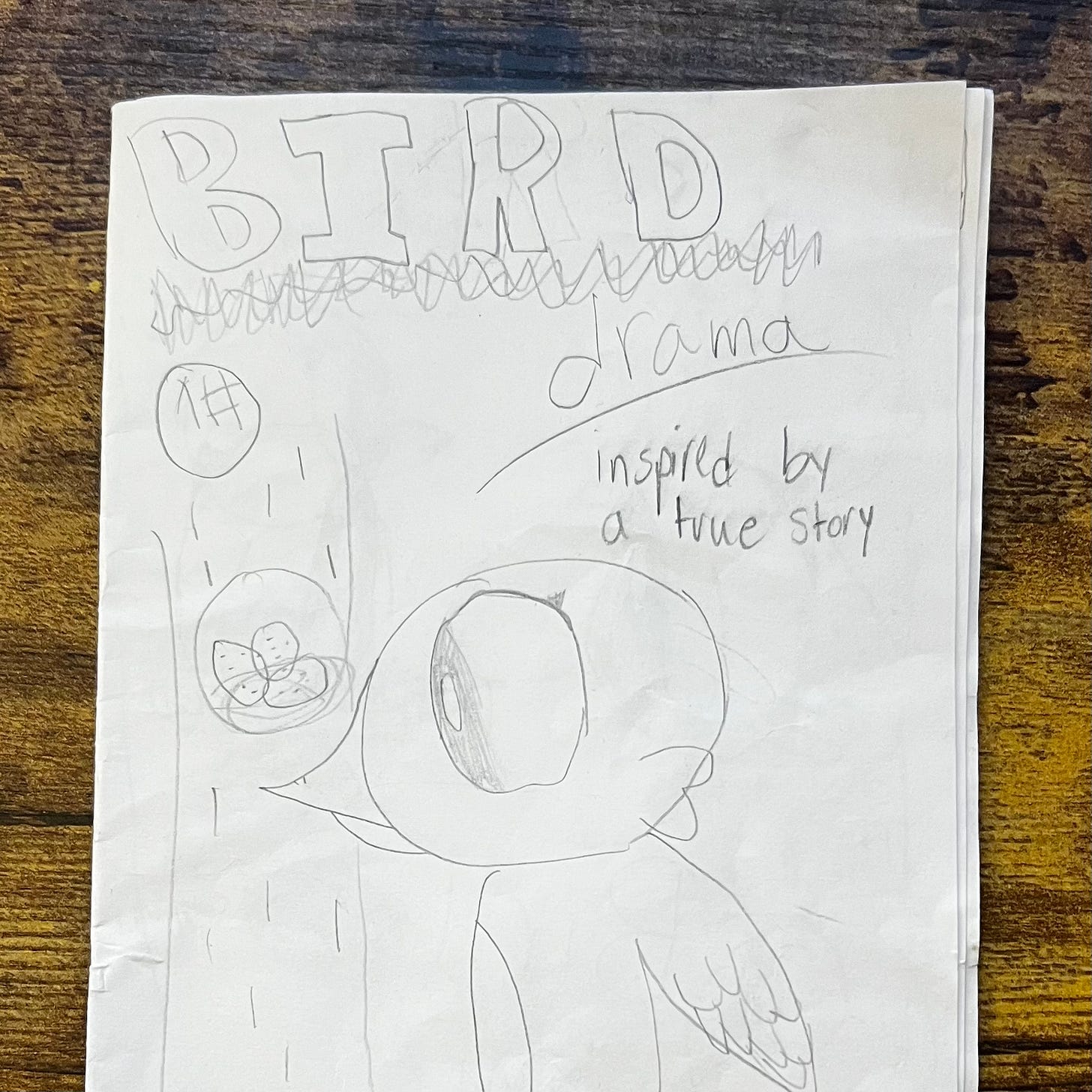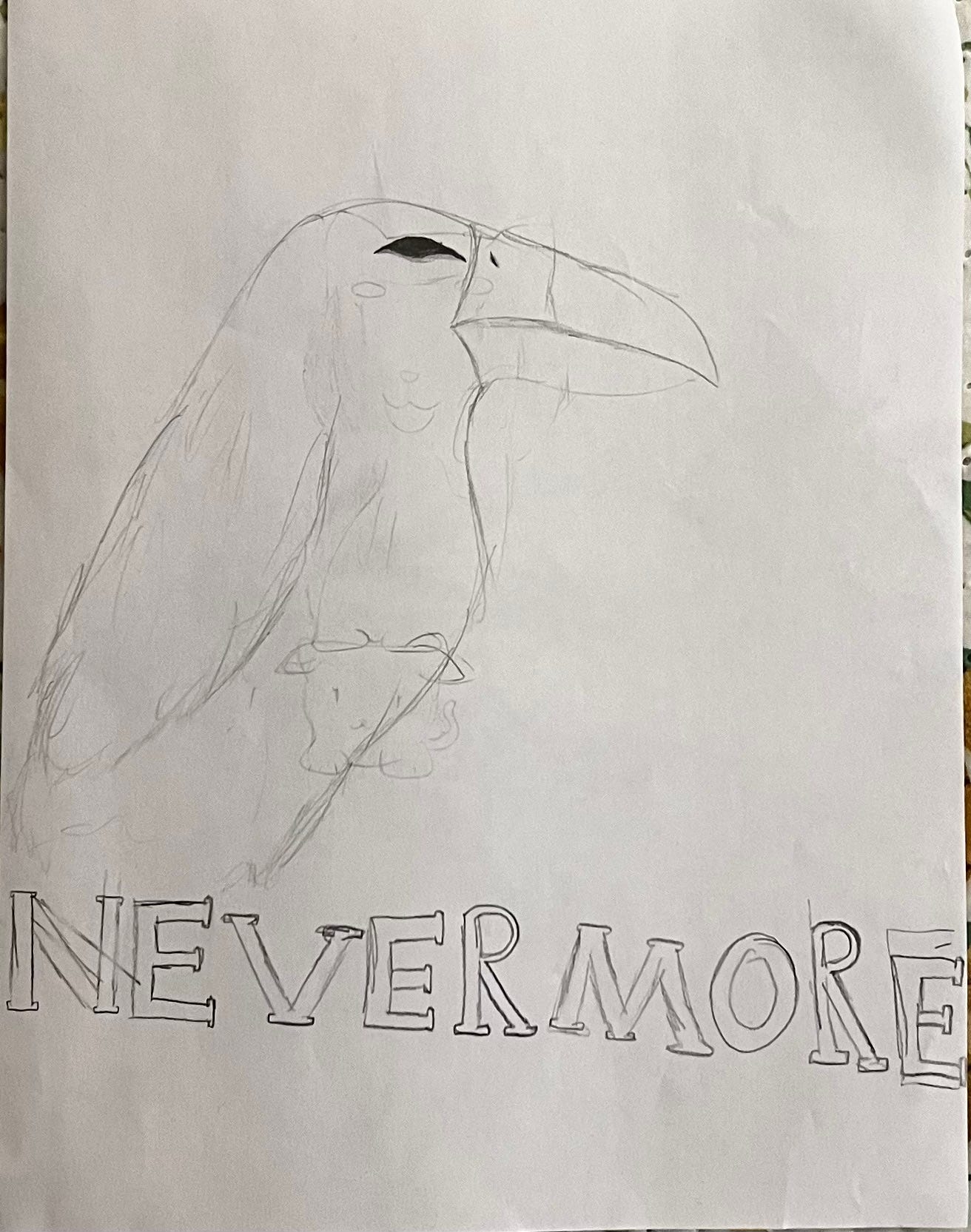Camp Mommy: A Summer Program for Feral Children
On reading Dunbar, “rewilding” the kids, defining moral luck, reviewing Seren of the Wildwood, and revisiting mixtapes
Although we live in New England, “Summer in the South” by Paul Laurence Dunbar resonates with me right now…1
The oriole sings in the greening grove As if he were half-way waiting, The rosebuds peep from their hoods of green, Timid and hesitating. The rain comes down in a torrent sweep And the nights smell warm and piney, The garden thrives, but the tender shoots Are yellow-green and tiny. Then a flash of sun on a waiting hill, Streams laugh that erst were quiet, The sky smiles down with a dazzling blue And the woods run mad with riot.
Though we have seen an oriole or two up here, we see mostly song sparrows, house sparrows, robins, mourning doves, Northern mockingbirds and cardinals. We live by a river so our summer is lush and vibrant—in both how the season looks and sounds. We have some nature around us, but it isn’t much. We are lucky to live in an area that was shaped by the Olmsteads and their progressive ideas toward preserving green space for the public.
I am constantly thinking about our relationship with the natural world, and I have been intrigued with Rewilding Britain project. Rewilding is defined as,
the large-scale restoration of ecosystems to the point where nature is allowed to take care of itself. Rewilding seeks to reinstate natural processes and, where appropriate, missing species—allowing them to shape the landscape and the habitats within. It’s focused firmly on the future although we can learn from the past.
The idea of letting things go to seed and watching what happens is attractive in how low maintenance it appears, but there is a lot of work and deliberation to this approach.
And then I thought… could we “rewild” the kids for the summer? What if I didn’t schedule my kids for anything? Could we let them run free (but within limits) so they could discover their passions, and then take this new information so we could help guide their academics once the new school year started?
Not so much. They all seem pretty passionate about sleep and cookies.
However, we do live near nature so it is easy enough for them to be out and about. But we know there are dangers…

Over the years we have had seen lifeless bodies of a number of vulnerable creatures. It is sad, but in a way it is probably good for them to understand this is all part of life. I think most modern kids are sheltered from death (other than, maybe, roadkill). Natural death is such an abstraction so that when it does happen no one knows how to talk about it or work through it.
Last week we had a particularly graphic scene. The girls witnessed a female sparrow strike against our sliding door. The bird fell to the ground on their other side of the glass and for more than a half hour they watched as the bird struggled painfully, getting up and falling over repeatedly. Finally it dropped to its side and died.
Afterward my husband said, “If the girls weren’t there I would have just…" and he brings two fists together to make the break-neck motion.
At this I asked, “Is this a case of bad moral luck? Where circumstances create a situation where you are made to act in a negative moral way? Or is this a morally neutral situation where it just feels wrong to let the bird suffer but to take its life?”
Cue an hour of reading aloud philosophy articles to each other on the interwebs and watching philosophy videos on YouTube. This is the way of our house.
The issue of bad moral luck plays a part in The Ethics of Beauty, the huge book I have been slow reading for a few months. I recently revisited the first part about war—which of course involves all sorts of bad moral luck.The conversation also mentioned how the Iliad was told as a way to help veterans of war deal with the trauma of war. It referenced another book on my shelf, Achilles in Vietnam.
So the roles of beauty, trauma, and storytelling are top of mind for me.
I think about the Iliad and many of our oldest stories, like fairy tales and the lessons they are supposed to impart to us—young and old. And again, the mystery of the woods and nature comes up because not only is there life and death, but there is also magic.
I just finished Marly Youman’s Seren of the Wildwood which is a novel in verse—61 poems in all. Not only is the story beautifully and masterfully crafted, but the text laid on the page evokes a primal shape—like an east-facing Easter Island Moai. Twenty-one lines of blank verse followed by a single iambic line and finished by four lines of iambic trimeter. Despite looking like a children’s book this is not for the young. Seren is violently betrayed in more than one way. For some readers the ending would feel cheap if it were not for Youman’s exquisite language—consistent to the last words. She tells her own tale
Around A hearth and wildwood blaze On nights in winter crowned By the strange, striking lays That hold motals spellbound.
And so like my child who works through the violence of the natural world through her stories and drawings, Seren sings of her own survival.
We all use narrative to claim our memories, to give witness and make meaning. Comics, novels, epic poems, movies… it is all art.
And Art is a powerful tool with which we convey meaning…
And Beauty attracts and magnifies…
And Technology can then amplify…
So it has come to my attention that people actually want me to create mixtapes! I looked into getting an old-school magnetic tape recorder and the cassette tapes but that would mean the recipient would need a player and I would have to mail the tape somehow… it just didn’t seem very practical.
However, Substack has a fairly easy to use podcast option, and I thought I could produce a twice monthly show for people who want poetry. I would be limited to work that was in the public domain or where I would have a poet’s/publisher’s permission, but we could try it out if there was enough interest.
To start, I would only do one poem per podcast with an explanation of why I love the poem and want to share it with the named recipient. I could also do some analysis on form and historical and biographical context.
Let me know in the comments if this sounds appealing.
Poem is in the public domain.






HI Zina, yes, yes, yes a thousand times over to the poetry podcast. Plus, I'd guess that living poets with material not in the public domain would grant you permission to use a poem of theirs more than you might expect. "Hey, I adore your work and would love to share it on "The Beauty of Things" could easily do the trick with any poet with true poetry in their soul.
I would also love a poetry podcast!